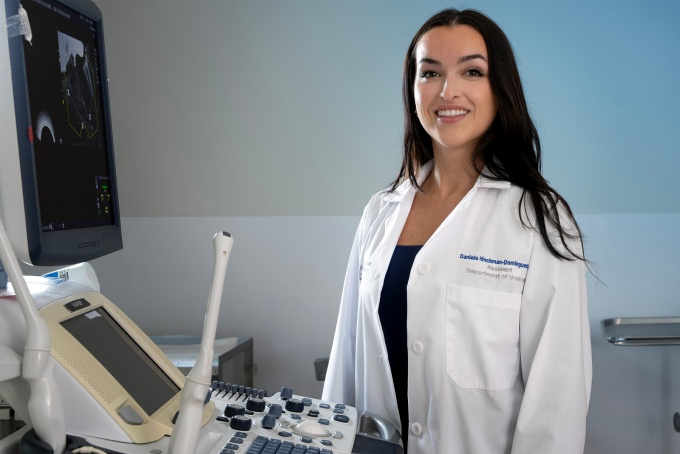PGY-2

If you — like our current residents, including Daniela Hinchman-Dominguez, MD — pride yourself on undertaking challenges and striving to provide patients with high levels of care and competence, you’ll be a good fit in our program.
During your second year, you’ll build on the skills you developed during your first year of training. You’ll also gain opportunities to supervise and guide medical students.
The second year of our program gives you ample opportunities to deepen the knowledge you acquired during your first year. We’ll help you strengthen your ability to:
- obtain a urologic history
- perform complete urologic physical examinations
- understand the indications and limitations of diagnostic techniques
- provide pre-, peri- and post-operative care
We’ll acquaint you with laser treatments, and you’ll become more familiar with indications for performing common urologic procedures. Further, we’ll train you to perform fundamental urologic procedures such as ureteral catheterization, urethral dilation, retrograde pyelography and ureteroscopy.
Additionally, as a second-year trainee, you’ll learn to evaluate patients in the emergency room.
You’ll gain valuable experience when you respond to urologic emergencies — as well as requests for urologic consultation from other services — and formulate a plan of management. You’ll sharpen your communications skills when you discuss matters with senior residents and our faculty members before implementing plans.
Surgical Experience
During your second year of training, you’ll gain an understanding of all surgical and technical procedures associated with urologic surgery.
We’ll introduce you to micro-surgical techniques, and you’ll progressively increase your endoscopic abilities. You’ll develop your skills in cystoscopy, ureteroscopy, nephroscopy and laparoscopy at every training site.
We make sure you’re present at all surgical procedures, both open and endoscopic. Initially, you’ll serve as an assistant, so you can observe and learn operative procedures and techniques.
When our faculty members determine you’ve made enough progress, they’ll guide you as you perform parts of urologic operative procedures.
As you did in your first year, you’ll follow patients from their pre-operative through their post-operative course — and we’ll enable you to learn about long-term follow-up with clinic patients.
By the end of your second year, you’ll find yourself able to manage and treat complications of urologic surgery.
Robotic Surgery
Our junior residents complete online training modules in robotic surgery; these are more focused than the modules for first-year residents.
You will have the opportunity to use both da Vinci surgical trainers for virtual instruction as well as dedicated mock sessions focusing on skills such as suturing. Through a minimum of 10 cases, we’ll help you develop into a skillful bedside assistant.
Rotations
| Location | Duration |
|---|---|
| Buffalo General Medical Center | 4 months |
| Erie County Medical Center | 4 months |
| Buffalo VA Medical Center | 4 month |
Didactics
During your second year, we’ll require you to attend all conferences, as they enable you to participate in meetings and lectures that contextualize and build on the core of your training.
We’ll ask you to present at each conference at least once throughout the academic year — except for at the surgical skills and tumor board conferences, where only faculty members present.
What’s one major benefit of our conferences? They continue to expand your ability to interpret urograms, MRI, CT scans, urodynamics, cystometrograms and other studies.
Another benefit of our conferences and didactics is that you’ll begin to gain exposure to pediatric urology.
Teaching Experience
You’ll have opportunities to teach medical students during your rotations at Buffalo General Medical Center, Erie County Medical Center and the Buffalo VA Medical Center.